ELI5: What exactly is quantum computing anyway?
Arjun Aravind • 12 July 2020 • 10 min read Quantum computing sounds like a word you might hear either in a Rick and Morty episode or out of the mouth of some super-smart physicist from CERN or NASA. It sounds all mysterious and scienc-y and something straight out of the future. And that, it truly is.
Quantum computing sounds like a word you might hear either in a Rick and Morty episode or out of the mouth of some super-smart physicist from CERN or NASA. It sounds all mysterious and scienc-y and something straight out of the future. And that, it truly is.
I was first introduced to quantum computing a few months ago from this Pluralsight talk that I listened to by Johnny Hooyberghs. I didn't really understand it fully and I still don't get a lot of the math behind it (although I am trying to learn).
However, I was seriously intrigued by it and the amazing things that we can do with a fully-realised quantum computer. So, in this article, I'm going to attempt to explain what quantum computing is, how it works, its application and the current state of the union. I won't be going into the math, I want to make it as easy as possible.
Alright, let's get into it!
Introduction to Quantum Computing
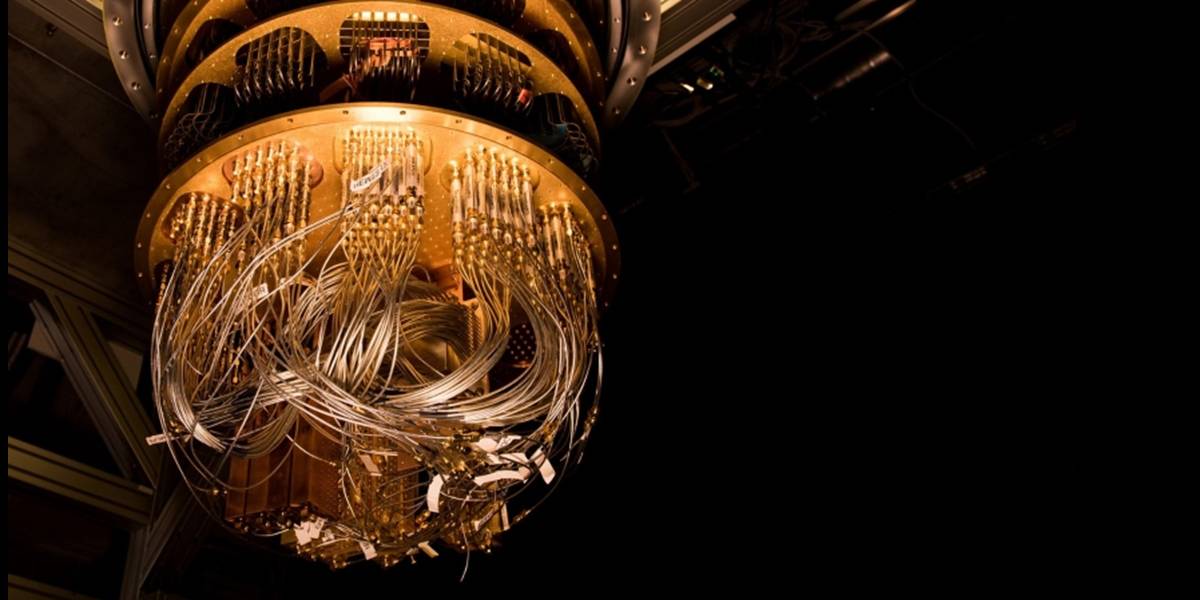
This is Sycamore, a quantum computer built by Google. Google claimed that it has achieved 'quantum supremacy'.
Quantum physics is a field that studies how particles behave at an atomic level. This is because particles at this small size such as electrons, atoms or photons behave differently than how things behave normally in nature.
These small particles exhibit certain phenomena and characteristics. For this article, we will only discuss about three of them. They are:- quantum superposition, quantum entanglement and the observer effect.
Together, these phenomena are what make quantum computing possible and so attractive. And, yes, don't worry, I will explain them in detail in the next section!
So...what is quantum computing? We can define quantum computing to be a computing system that utilises quantum physics and the different phenomena we talked about.
So far, so good, right? Alright.

Take a break if you want. Chill out.
Keeping that aside for now, let's briefly talk about normal computers. The ones that we use presently and are found in almost every home. We will refer to these as 'classical computers' to differentiate them from quantum computers.
As we all know, classical computers use bits to store and process data. If you don't know what a bit is, it's easy to think of it as a building block for a computer, the same way atoms are building blocks for matter.
A bit can store either a 0 or 1. Eight bits make a byte. Classical computers have an extremely large amount of bytes to store and process information. Usually, you'll know how many bytes your computer has by checking the RAM and storage specs.
So, classical computers have bits, correct? Quantum computers, on the other hand, have qubits (or quantum bits). They behave very similarly to bits. However, one special thing about qubits is that they exhibit the quantum phenomena that we mentioned earlier (scroll back up to see what they are!).
Let's read about these quantum phenomena, how they affect qubits and the working of a quantum computer.
Phenomena 1 - Quantum Superposition
Okay, this is very simple.
We talked about bits, right? The ones that are used in classical computers. And we mentioned how they can be either 1 or 0. Not both. Never both.
Qubits, however, are weird. They can be 0. They can be 1. They can even be both, at the exact same time!
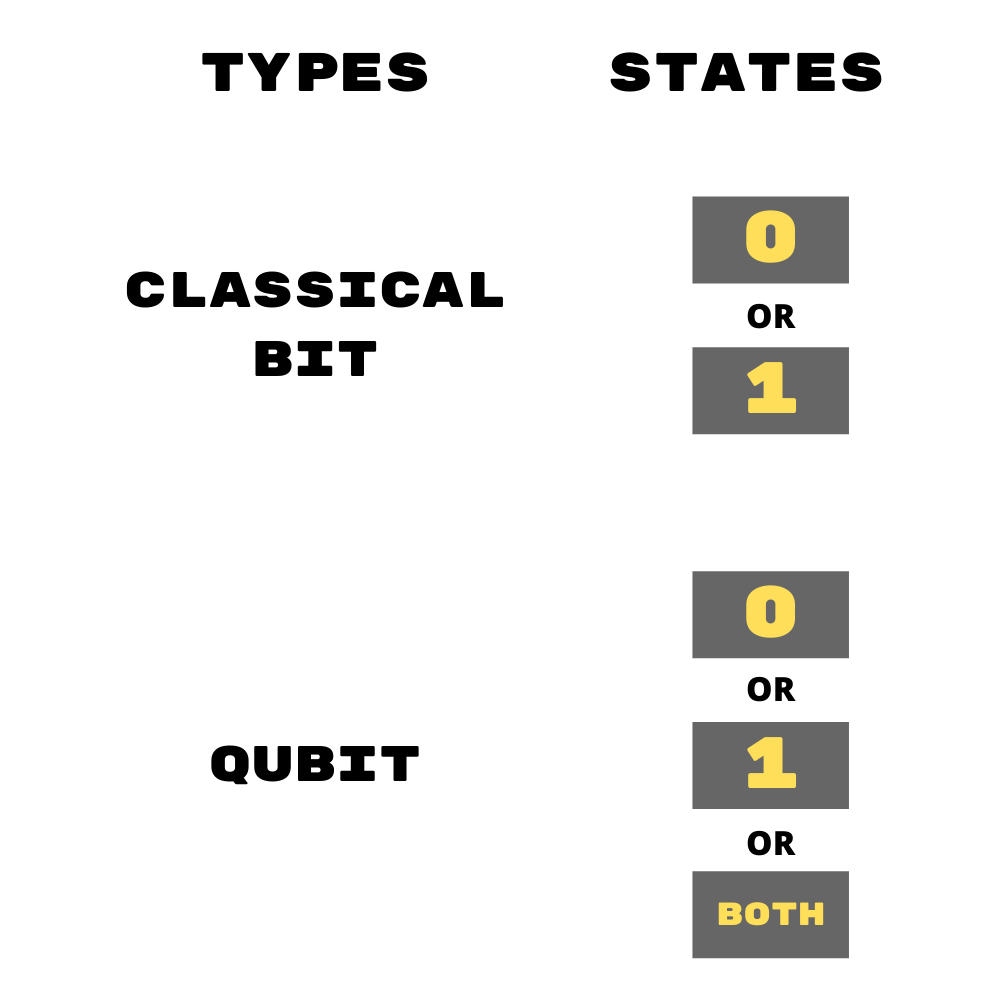
Qubits are weird as hell, man.
The picture mentions something called 'states'. The 'states' of a bit or qubit are the possible values that they can contain at any single point in time. In this case, 0 or 1 and 0 or 1 or both, respectively.
Now, this happens due to quantum superposition, where the state of the qubit is both 1 and 0. Don't ask me why, that's not in the scope of this article (I'm not 100% sure myself). Just take it at face value. The sun rises in the east, Russia is the world's largest country and qubits can be both 0 and 1.
So, what's so amazing about this? Good question. One classical bit has 2 possible values (or states) (0 and 1) but can only be one of them at once. Two classical bits together have 4 possible values (00, 01, 10 and 11) but can only contain one of those four values at a single point in time. Three classical bits together have 8 possible values (000, 001, 010, 011, 100, 101, 110 and 111) but can, again, only contain one of those eight values at once. And so on.
One qubit also has the same two possible values (or states) but, however, can be both at the same time, due to quantum superposition. Two qubits can have 4 possible values and can be all of them at the same time! Three qubits, similarly, can contain 8 different values, all at once! It's crazy.
What this means is that how many ever bits a classical computer contains, it can only contain one single state at once and operate on that one state.This might make you think about parallel computing. Even that can technically handle many states and operations at the same time. Well, yes, yes they can. However, as the scale of the problem increases, there is a point where parallel computing will not be able to keep up.
However, every qubit added to a quantum computer exponentially increases the number of states that it can contain at once. The computer can theoretically operate on all of these states at once, and that makes it super fast!
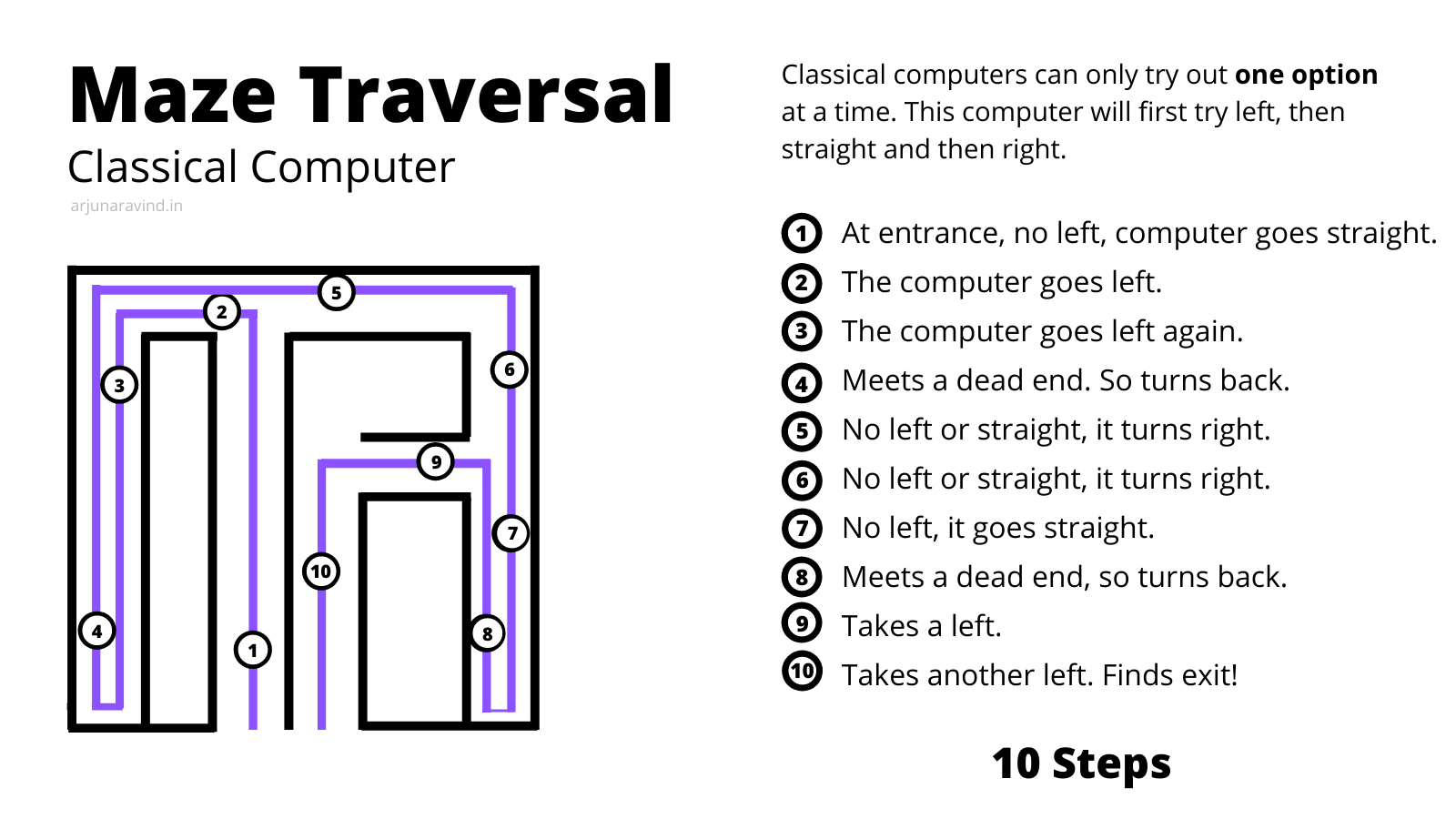
How a classical computer will find its way out of a maze. Zoom if you're on mobile!
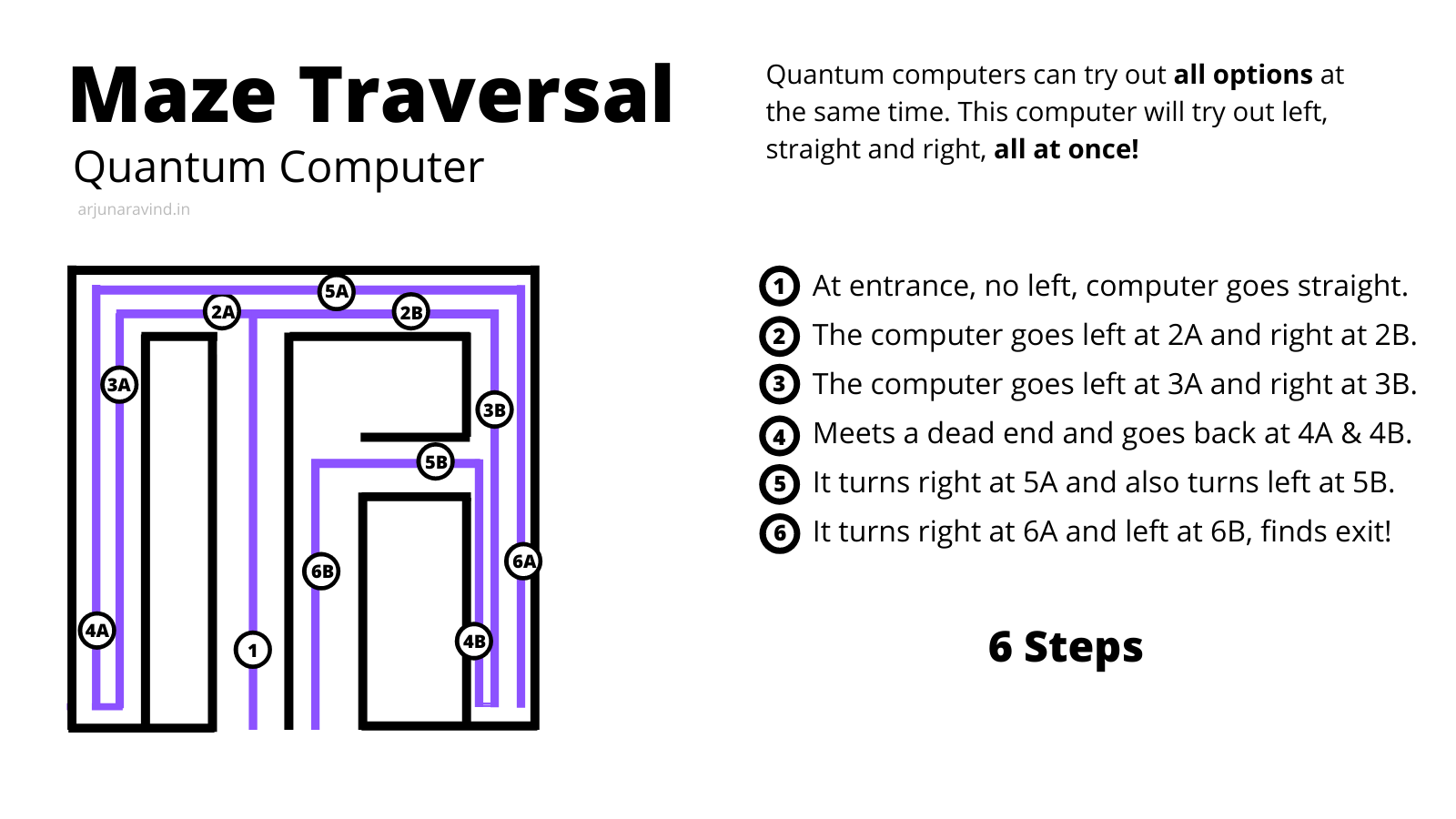
How a quantum computer will find its way out of a maze. Zoom if you're on mobile!
As you can see in the images above, the quantum computer is able to solve problems faster because it can handle multiple states (or options, in this case) at the same time. It's super fast!
Time for another break. I promise this was the biggest section. The rest are really small. Read on when you're ready!
Phenomena 2 - The Observer Effect
This one is relatively small, but it's really strange. The observer effect is a phenomena where observing or measuring a qubit will change its value!
Let's say we have a qubit and let's say that it is both 0 and 1. Weirdly, this qubit has to be in a closed space and must be unobserved. The moment we observe or measure the qubit's value, it immediately changes to either 0 or 1.
So, if a quantum computer is doing some calculation, just by observing the inner mechanisms, we might have a huge effect on the result! We might get a totally different answer.
Scientists aren't really able to explain why though. Check out the wikipedia article for some interesting reading.
Phenomena 3 - Quantum Entanglement
Oooh, this one is really interesting!
Quantum entanglement is the phenomena where two quantum particles show the same state, once they have been 'entangled'. Entanglement occurs naturally but can also be done synthetically by scientists. Once they are entangled, these particles display the same properties as the other. What's amazing is that if you change the properties or value of one particle, the other one immediately also changes to reflect the changed value.
It's almost like the particles are...communicating. Spooky.
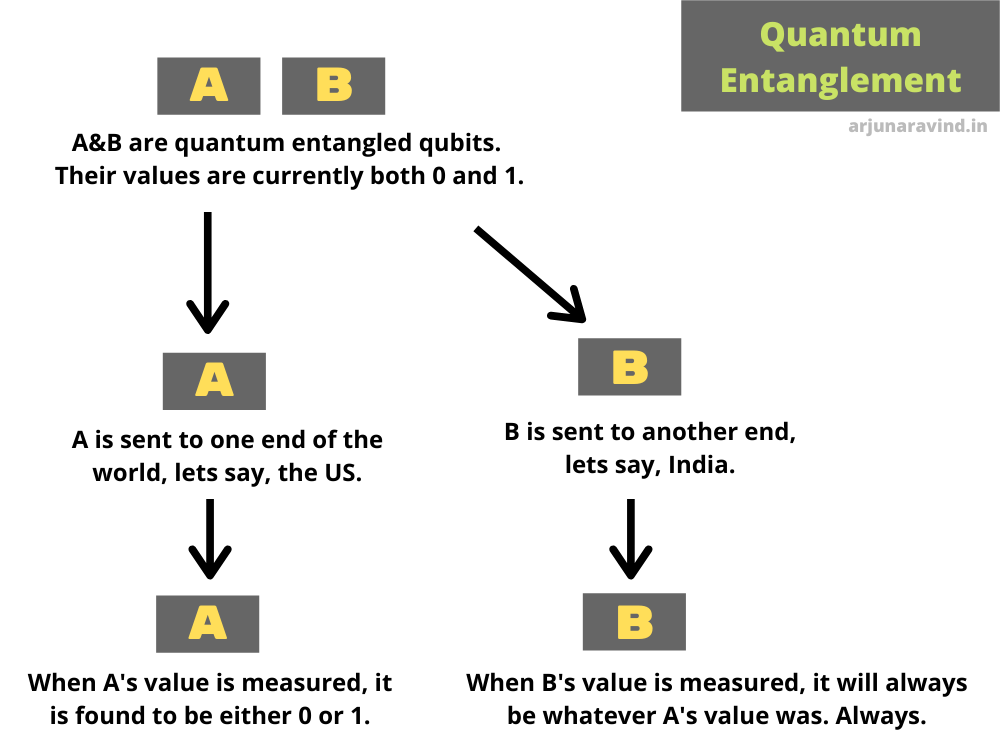
Huh.
Look at the picture. We have two qubits, both containing 0 and 1 at once. We assume that both qubits have been unobserved and not measured (why? scroll to the previous section).
We send one qubit to the US and one to India. Opposite ends of the Earth. When we measure the qubit in the US, due to the observer effect, its value becomes either 1 or 0. When we measure the one in India, its value will always be the value of the one in the US. And if we modify one of the qubits, the other one also gets modified, even though its half a world away!
Now, this is has fascinating applications! Imagine two people having a number of entangled qubits. They can basically 'communicate' just by modifying the qubit values.
The best part is that this is completely secure communication. It's not online, it's not through a network, it's communication through nature. Wow.I read somewhere that another possible application of quantum entanglement is teleportation. Jeez, imagine being able to teleport. I'm writing this article and I'm getting mindblown.
What are other interesting applications of quantum computing?
The speed of quantum computing could give us the power to do computations that we can only dream of. Computing-intensive applications such as Artificial Intelligence and Gene Editing could become a piece of cake.
What about simulation of an atom or molecule on a computer? Yes, that could be possible. Maybe even computationally finding out a cure for the Coronavirus. The applications are limitless.
How soon can we see Quantum Computers become a reality?
Quantum computers are already a reality. However, they are far less powerful or efficient as they can potentially be.
One of the problems with quantum computers is that it costs a lot to make them. And it costs even more to add performance and efficiency. For one, quantum computers have to be stored in a super-cooled environment and this has to always be closed ('cause of the observer effect).
Secondly, it's really hard to build a qubit as we need to basically trap and control a quantum particle (like an electron or photon) and use it for quantum calculations. Only big companies such as Google or IBM, who have an almost limitless budget, have been able to build somewhat powerful quantum computers. And, even then, a modern distributed classical computer can achieve these calculations in a similar time-frame.
So, unfortunately, the performant quantum computers that we have been discussing about won't be a reality, atleast to consumers, anytime soon. Physicists think that such a computer might be 10 or 15 years out, which actually isn't that far away. That's just, like, 7 Sherlock seasons.
---------------
So, I really hope that this article was easy to understand! I'll be putting up places to learn more and additional resources in an upcoming article. If you guys have any questions, clarifications or if you think I made a mistake somewhere, email me at arjun.aravind@yahoo.com or connect with me on LinkedIn. Seeya!









